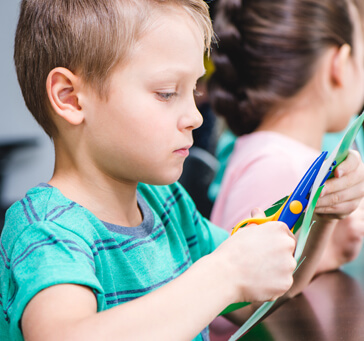


We at Chrysaellect believe that nothing can be taught. The teacher is not an instructor but rather a facilitator and a guide to nurture active minds to make meaning of their world. Meaningful learning happens when experiences are contextualized to the social environment. In our view children are capable, competent, and able to build their knowledge through active explorations, experience, discussions, and inquiry. They need to be provided with opportunities to develop questions, and to hypothesize about possible connections to extend their learning.
We believe in empowering individuals and companies to create, sustain and grow their own brands. To ensure this happens we provide our clients with
Social Constructivism
According to the theory of social constructivism, social worlds develop out of individuals’ interactions with their culture and society. Discussions and activities in the curriculum are designed to present an opportunity for new knowledge to be obtained, or present knowledge to be expanded.
Brain Research
Research, theory and experience in the field of early childhood education inform our curriculum development team to create our preschool curriculum frameworks. Recent brain research has improved our understanding of how and when children learn best. The human brain is affected by experiences and therefore children’s learning changes the physical structure of their brain. Every appropriate sensory motor experience that is provided to the child helps build brain connections.
Using this insight our curriculum provides a variety of activities to practice new skills. The Curriculum facilitates in creating rich experiences and positive interactions which affect learning, attention, memory and behavior in children.
Developmentally Appropriate
The typical development milestones of toddlers and preschoolers, as well as leeway for lags and spurts are used as a guide for curriculum planning. Observation, documentation and ongoing assessment of individual children and the classroom as a whole are used as the basis for curriculum planning.
Intentionally Planned Classroom environments
Intentionally planned classroom environments and experiences provide opportunities to inspire learning, discovery, creativity and problem-solving. Our curriculum framework allows for teachers to create these environments.
Teachers as Facilitators
We believe the teacher’s role is as a facilitator and guide. We guide and mentor teachers to use a variety of strategies, including modelling, providing appropriate learning materials, encouraging children’s independence, and planning learning experiences.
Active Learning Environments
A play-based, hands-on, active learning environment is most conducive for young learners. We believe that this approach, which includes the whole child, prepares children well for future success, both in school and in their lives. The curriculum and learning environments are intertwined to offer opportunities for exploratory play where children can manipulate materials, hypothesize, test theories, repeat activities and draw conclusions. In their social play, children learn how to be a member of a larger community.
Multiple Intelligences
Children have different gifts and there is no one way that they learn best. Through the curriculum children will have exposure to a variety of individual as well as group activities to suit their learning needs and styles.